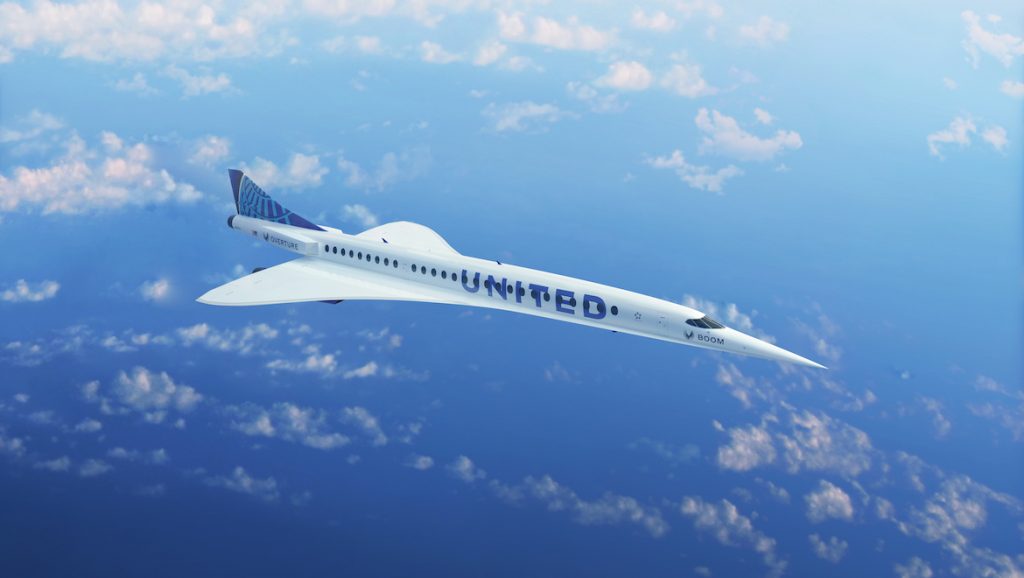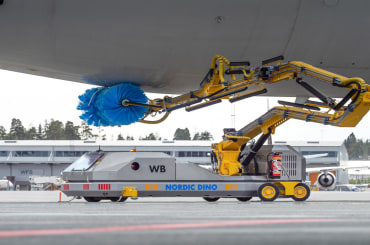
United Airlines has announced a new deal struck with Denver-based Boom Supersonic for the purchase of 15 of its supersonic commercial passenger jets, in a deal worth over US$3 billion.
The penned deal will see United Airlines welcome 15 Boom ‘Overture’ passenger aircraft, once certified and operational, with an option to take on an additional 35 of the supersonic aircraft.
Boom Supersonic has been vying for years to be the first company to see the return of supersonic passenger travel since the downfall of the legendary Concorde, which could see air travel times cut by up to half.
Boom has already produced its one-third scale demonstrator model, XB-1, affectionately dubbed the ‘baby boom’, as a testbed for its future full-sized Overture.
The company suggested recently that its demonstrator model XB-1 could take its first test flight as soon as the end of this year, and that its full-sized, 88-seat Overture model could roll out of its manufacturing plant in 2025.
Following this, the all-business-class, net-zero carbon emissions Overture should see its first test flight in 2026, and is expected to enter into service by 2029, according to Boom.
Capable of reaching speeds up to Mach 1.7, Boom Supersonic said it has over 500 planned destinations for its Overture aircraft, including Newark to London, Newark to Frankfurt, and San Francisco to Tokyo, all of which can be achieved in about half the time as conventional aircraft.
Boom said that it and United would work together to ensure Overture’s final form meets United’s “demanding safety, operating and sustainability requirements”.
As such, in light of long-standing criticism against supersonic aircraft using greater fuel loads than subsonic planes, and United’s pledge to reduce its greenhouse gas emissions 100 per cent by 2050, the Overture is set to fly on 100 per cent sustainable aviation fuel (SAF).
“United continues on its trajectory to build a more innovative, sustainable airline and today’s advancements in technology are making it more viable for that to include supersonic planes,” said United chief executive Scott Kirby.
“Boom’s vision for the future of commercial aviation, combined with the industry’s most robust route network in the world, will give business and leisure travelers access to a stellar flight experience.
“Our mission has always been about connecting people and now working with Boom, we’ll be able to do that on an even greater scale.”
Meanwhile, Boom Supersonic founder and CEO Blake Scholl said, “The world’s first purchase agreement for net-zero carbon supersonic aircraft marks a significant step toward our mission to create a more accessible world.
“United and Boom share a common purpose — to unite the world safely and sustainably.
“At speeds twice as fast, United passengers will experience all the advantages of life lived in person, from deeper, more productive business relationships to longer, more relaxing vacations to far-off destinations.”
With the benefit of 21st century technology, these new supersonic jets are set to be both quieter and more fuel efficient than the iconic Concorde, as it battles to meet current-day standards for aircraft noise pollution and carbon emissions, Scholl revealed earlier.
The deal comes less than two weeks after the fall of Aerion Supersonic, a Boeing-backed start-up company that also joined the race to be the first supersonic passenger jet on the market since Concorde.
Aerion announced it had officially ceased operations, after struggling to secure the necessary financial investment it required to build its AS2 supersonic business jets.
The company previously announced that it would need to raise about US$4 billion in order to get its AS2 jet to production, with a further US$1 billion alone to be spent on engine development, and had plans underway to construct a US$375 million production factory in Melbourne, Florida, near Orlando Melbourne International Airport.
Aerion racked up over US$11 billion in orders for its US$120 million AS2 supersonic business jet, including high-profile orders made by aircraft fractional ownership companies Flexjet and Netjets for 20 aircraft each.
And yet, the company has confirmed that it was unable to secure enough capital to bring the AS2 jet to life.
“The AS2 supersonic business jet program meets all market, technical, regulatory and sustainability requirements, and the market for a new supersonic segment of general aviation has been validated with US$11.2 billion in sales backlog for the AS2,” the company said in a statement.
“However, in the current financial environment, it has proven hugely challenging to close on the scheduled and necessary large new capital requirements to finalise the transition of the AS2 into production.
“Given these conditions, the Aerion Corporation is now taking the appropriate steps in consideration of this ongoing financial environment.”













